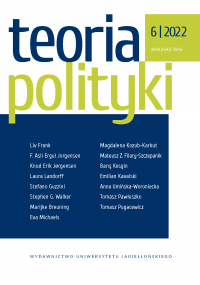Binary Role Theory and Levels of Role Change in World Politics: When Do Leaders Make a Difference?
Binary Role Theory and Levels of Role Change in World Politics: When Do Leaders Make a Difference?
Author(s): Stephen G. WalkerSubject(s): Political Sciences, Political behavior
Published by: Wydawnictwo Uniwersytetu Jagiellońskiego
Keywords: binary role theory; levels of role change; leadership;
Summary/Abstract: The problem of understanding when and how change happens in world politics is under-conceptualized. One potential source of change for further examination is the relationship between change and the leadership of states and international institutions. The decisions and actions of leaders are an immediate source of both peaceful and violent change. A change of leaders may simply be an endogenous marker for a shift in historical forces that explain change in world politics, or leaders may be indispensable in explaining change at state and systemic levels of analysis. Are leaders the pilots or simply passengers on states caught in the tides of history? Binary role theory offers a coherent account of “role change”specified by the interactions and outcomes between leaders and historical situations, which is a more nuanced “both/and”account than a simple “either/or”answer to this question. The interactions and outcomes that model role change are first presented in the abstract terms of role theory and then illustrated with two case studies of UK-Iran and US-Iran relations.
Journal: Teoria Polityki
- Issue Year: 2022
- Issue No: 6
- Page Range: 59-80
- Page Count: 22
- Language: English

